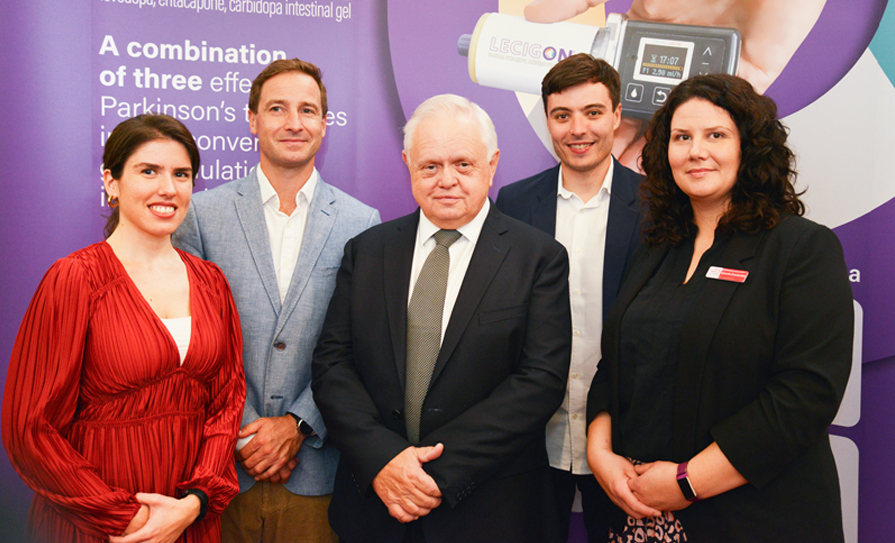Healthcare professionals (HCPs) from the Republic of Ireland joined Prof Edmond Smyth
of the Beacon Hospital in Dublin, Prof John Moore of Belfast City Hospital, and Dr Eavan Muldoon of the Mater Hospital in Dublin, for a webinar on antimicrobial resistance (AMR) and the opportunities and challenges of antimicrobial stewardship
Experts recommend redoubling efforts to tackle AMR, which is predicted to be a major threat to public health by 2050. An educational medical webinar, sponsored and organised by A.Menarini Pharmaceuticals on the 16th of November 2021, titled ‘Antimicrobial Resistance: The Silent Pandemic’, aimed to provide new insights into the consequences of AMR and empower healthcare professionals to implement safe and effective antimicrobial use.
The meeting was chaired by Prof Edmond Smyth, Consultant Medical Microbiologist in the Beacon Hospital, Dublin, and featured two other medical experts, Prof John Moore, Clinical Microbiologist in Belfast City Hospital, Belfast, and Dr Eavan Muldoon, Consultant in Infectious Diseases in the Mater Hospital, Dublin.
In 2001 Prof Smyth chaired the Strategy for control of Antimicrobial Resistance in Ireland (SARI) Committee, following which the concept of antimicrobial stewardship was formally introduced into Ireland for the first time.
Prof Moore has authored and co-authored over 500 peer-reviewed papers in several national and international journals on the clinical microbiology of cystic fibrosis and previously spearheaded an initiative, between Japan and the UK, examining AMR. Dr Muldoon was the inaugural recipient of the Frank P Tally Fellowship in Infectious Diseases at Tufts Medical Center (Boston, Massachusetts, US) and received the Kass Award for Clinical Excellence from the Massachusetts Infectious Diseases Society.
Prof Smyth introduced the meeting by touching briefly on the importance of discussing AMR and stewardship, especially in the context of the ongoing Covid-19 pandemic.
‘Antimicrobial resistance: New insights’
Prof Moore began the webinar by briefly introducing the problem of AMR during his presentation titled ‘Antimicrobial resistance: New Insights’. He gave an overview of antibiotic resistance patterns emerging across the world, and highlighted the challenge of treating CF patients infected with highly resistant organisms, especially pan-resistant strains of Pseudomonas aeruginosa.
Prof Moore gave a summary of the history of antibiotic discovery and remarked on its slow-down in recent years. He then discussed the escalating threat to public health caused by the global emergence of carbapenem resistance in Enterobacteriaceae, explaining that: “Carbapenem-resistant Enterobacteriaceae are usually resistant to all β-lactam agents, as well as most other classes of antimicrobials. This can lead to severe infections among residents of long-term care facilities and care homes.”
He went on to share several real-world patient questions that require consideration by healthcare professionals in the context of AMR.
The role of laboratories
Prof Moore also discussed the importance of having adequate laboratory susceptibility testing capacity and turnaround-times. “As we see more and more resistance develop, we have to be able to counter that by having effective laboratory antimicrobial susceptibility testing assays in place,” he said. “That will allow antibiotic combinations to be decided upon and communicated to the physician.” He also suggested utilising local laboratories for microbiological testing, as they often meet quicker turnaround times than reference laboratories.
Looking to the future
Prof Moore provided some new insights by introducing several novel strategies currently being developed to treat infections that do not compromise antimicrobial susceptibility. He gave the example of utilising biocontrol with predatory bacteria, such as Bdellovibrio bacteriovorus, on pathogens, including Burkholderia cepacia complex, in cystic fibrosis. Prof Moore also showcased the work of doctors at University Hospital Southampton, who pioneered a nose drop containing Neisseria lactamica, a commensal bacterium that competes with Neisseria meningitidis, thus protecting against meningitis. In addition to these strategies, harnessing the potential of bacterial and other vaccines to help reduce the need for antimicrobials is vital, he said.
‘Antimicrobial stewardship:
Challenges and opportunities’
Dr Muldoon discussed the importance of antimicrobial stewardship and how it can be implemented within a clinical setting. She said that stewardship can be defined as: “The right antibiotic, for the right patient, at the right time, with the right route, causing the least harm to patients and future patients.” She also noted that while the perception is often that stewardship focuses solely on policing and stopping antimicrobial use, it is more about optimising the antimicrobial prescription for each individual patient.
Challenges and barriers
Dr Muldoon outlined the challenges of antimicrobial stewardship, which include influencing behavioural changes in prescribing practice, inadequate medical education, limited resources, and the lack of rapid diagnostics.
Antimicrobial guidelines are not always followed due to a number of issues, including lack of awareness and concerns over applicability based on patient populations observed in clinical trials. Additionally, many clinicians are unable to perform the type of diagnostics outlined in guideline recommendations due to limited knowledge, lack of training or slow laboratory turnaround times.
Dr Muldoon also discussed the impact of Covid-19 on prescribing antimicrobials. She described how over the course of the pandemic, there has been an increase in antimicrobials used in hospitalised patients with Covid-19; however, the data show that there is no advantage in using antibiotics due to low levels of true bacterial coinfection in these patients.
Opportunities to improve antimicrobial stewardship
Dr Muldoon recommended using other methods of infection control, such as source control, which can be used without the need for antibiotics. “Source control can be very important in controlling some infections, not only to ensure the best patient outcome, but also to prevent further development of antimicrobial resistance.”
Dr Muldoon stressed the importance of medical education in stewardship and elaborated that different approaches should be taken for medical students and continuing medical education programmes. For medical students in particular, infection is often difficult to fit into a systems-based learning programme. Dr Muldoon posited that: “Infection can become a bit of a no-man’s land, because it touches upon every system. In some cases it is no longer taught by infection specialists and can perhaps lose some of its emphasis.”
Other healthcare professionals play a vital role in preventing the spread of AMR; for example, pharmacists distribute antimicrobials and, therefore, have access to data on prescribing patterns, including departments that prescribe antimicrobials more frequently. Nurses, due to their frontline role, can identify important information and concerns, such as transitions from intravenous to oral antimicrobials. This information can be relayed to members of other teams to better inform their decisions. Furthermore, she highlighted the role of biomedical scientists who perform checks and balances on the reporting of antimicrobials.
Does one size fit all?
Dr Muldoon discussed how taking a customised approach when implementing an antimicrobial stewardship programme is important. Programmes need to be adapted according to specific problems that arise in a specific hospital, specific patient groups, and complications commonly seen. Also, it should be considered whether prescribers respond better to a restrictive or a collaborative approach.
Q&A
During an interactive Q&A-style discussion, Prof Smyth queried the effects of Covid-19 on AMR. Dr Muldoon responded that patients with Covid-19 have been receiving inappropriate antimicrobials which are not impacting their outcomes. When in isolation, patients are checked on less frequently by healthcare staff; thus there are fewer prompts to discontinue antimicrobials. In addition, lack of face-to-face interactions with patients and within teams have made it more difficult to change behavioural norms. Sharing the impact the Covid-19 pandemic has had on his patients with cystic fibrosis, Prof Moore explained that because of Covid-19, there has been a growth in telemedicine, which has made acquiring sputum samples from patients more difficult due to regulatory reasons. Sputum samples are an important part of monitoring patients with cystic fibrosis.
In their concluding remarks, Dr Muldoon reiterated the importance of culture data and diagnostics in clinical decision-making, while Prof Moore emphasised prescribing sufficient antimicrobial concentrations to prevent the development of further resistance while optimising clinical outcomes in patients.










Leave a Reply
You must be logged in to post a comment.